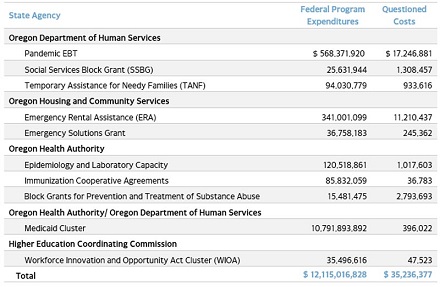Serious control weaknesses found with programs receiving federal funds
State auditors found millions of dollars in questioned costs and serious control weaknesses at a number of programs receiving federal funds, according to a
report released by the Oregon Secretary of State's Audits Division.
Every year, the division conducts two major financial audits: the 285 page
Annual Comprehensive Financial Report and
Statewide Single Audit. Auditors also draft and release a report summarizing both of these audits. The summary report for fiscal year 2022, called
Keeping Oregon Accountable, has now been released.
The federal government requires audits of the state’s financial statements and compliance with federal program requirements for Oregon to continue receiving federal assistance. In the past, this funding has usually ranged from $11 to $12 billion each year. Since the pandemic, federal funding has ballooned — in fiscal year 2022, Oregon received $21 billion in federal aid.
“Our financial audits are a critical part of keeping Oregon government accountable to its people,” said Audits Director Kip Memmott. “This year’s statewide audits found some significant issues that we think are important to bring to the attention of Oregonians, the Governor, and the Legislature.”
A D V E R T I S E M E N T

A D V E R T I S E M E N T
According to the Secretary of State's office, the audits are noteworthy for two reasons: more questioned costs, and far more modified opinions.
Questioned costs has a very specific meaning for auditors. It’s a term required by the federal Office of Management and Budget; when auditors question costs, they are referring to program costs that may or may not be allowed to be paid with federal funds.
“It serves as a flag for federal funding agencies to review the findings and then decide whether the costs are allowable,” said Tracey Gates, a principal auditor with the division.
In fiscal year 2021, auditors identified $10 million in questioned costs. For fiscal year 2022, questioned costs increased by more than $20 million, totaling $35.2 million at 10 programs in five agencies. Of that amount, $9.1 million were directly identifiable costs, while the remainder were likely errors, based on sample testing.

And then there are the modified opinions, several of which were issued in this year’s audits. “When an audit shows controls are sufficient and the program is generally in compliance with federal requirements, we issue what’s called an unmodified, or clean, opinion,” Gates said. “An unmodified opinion is a good thing. But if we have concerns about the quality of internal controls, we have to issue modified opinions.”
An adverse opinion was issued for the Emergency Rental Assistance Program at Oregon Housing and Community Services under the direction of Andrea Bell, meaning control weaknesses were pervasive enough that the controls would not prevent, or even detect, significant noncompliance.
Additionally, a disclaimer of opinion was issued for the Emergency Solutions Grant Program, also at OHCS. A disclaimer of opinion means there was not sufficient, appropriate evidence for auditors to even issue an opinion on program compliance.

Qualified opinions are less severe but indicate that internal controls are still inadequate to prevent or detect significant noncompliance. Auditors issued qualified opinions for five programs at three agencies: OHCS, DHS, and the Oregon Health Authority. Two of these programs -- Temporary Assistance for Needy Families, and the Low-Income Home Energy Assistance program -- have been issued qualified opinions for several years now.
What will happen as a result of these opinions?
“It’s up to the federal granting agencies,” Gates said. “They are responsible for following up on our findings and only they have the authority to enforce grant requirements. This could include sanctions or a change in future funding, but it could also result in a clarifying change to the requirements.”
--Staff Reports| Post Date: 2023-09-20 11:57:55 | Last Update: 2023-09-20 15:45:07 |








 And then there are the modified opinions, several of which were issued in this year’s audits. “When an audit shows controls are sufficient and the program is generally in compliance with federal requirements, we issue what’s called an unmodified, or clean, opinion,” Gates said. “An unmodified opinion is a good thing. But if we have concerns about the quality of internal controls, we have to issue modified opinions.”
And then there are the modified opinions, several of which were issued in this year’s audits. “When an audit shows controls are sufficient and the program is generally in compliance with federal requirements, we issue what’s called an unmodified, or clean, opinion,” Gates said. “An unmodified opinion is a good thing. But if we have concerns about the quality of internal controls, we have to issue modified opinions.”
 Qualified opinions are less severe but indicate that internal controls are still inadequate to prevent or detect significant noncompliance. Auditors issued qualified opinions for five programs at three agencies: OHCS, DHS, and the Oregon Health Authority. Two of these programs -- Temporary Assistance for Needy Families, and the Low-Income Home Energy Assistance program -- have been issued qualified opinions for several years now.
Qualified opinions are less severe but indicate that internal controls are still inadequate to prevent or detect significant noncompliance. Auditors issued qualified opinions for five programs at three agencies: OHCS, DHS, and the Oregon Health Authority. Two of these programs -- Temporary Assistance for Needy Families, and the Low-Income Home Energy Assistance program -- have been issued qualified opinions for several years now.